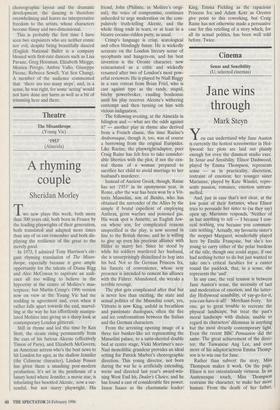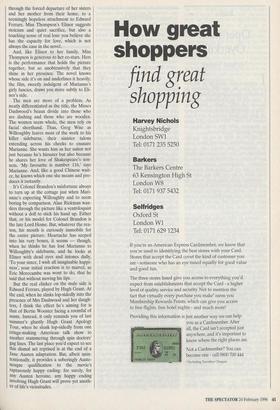Cinema
Sense and Sensibility (U, selected cinemas)
Jane wins through
Mark Steyn
You can understand why Jane Austen is currently the hottest screenwriter in Hol- lywood: her plots are laid out plainly enough for even the dimmest studio exec. In Sense and Sensibility, Elinor Dashwood, played by Emma Thompson, represents sense — as in practicality, discretion, restraint of emotion; her younger. sister Marianne, played by Kate Winslet, repre- sents passion, romance, emotion untram- melled.
And, just in case that's not clear, at the low point of their fortunes, when Elinor tries to persuade her sister to (as they say) open up, Marianne responds, 'Neither of us has anything to tell — I because I con- ceal nothing, you because you communi- cate nothing.' Actually, my favourite sister's the moppet Margaret, wonderfully played here by Emilie Frangoise, but she's too young to carry either of the polar burdens of the title, though one could argue, if one had nothing better to do but just wanted to take one's critical faculties for a canter round the paddock, that, in a sense, she represents the 'and'.
In any case, the real tension is between Jane Austen's sense, the necessity of tact and moderation of emotion, and the latter- day Hollywood sensibility, of yay-go-for-it, you-can-have-it-all! Merchant-Ivory, for one, go to great trouble to recreate the physical landscape, but treat the past's moral landscape with disdain, unable to regard its characters' dilemmas in anything but the most drearily contemporary light. Even the recent BBC Persuasion did the same. The great achievement of the direc- tor, the Taiwanese Ang Lee, and even more of his adaptor/actress Emma Thomp- son is to win one for Jane.
Rather than subvert the story, Miss Thompson makes it work. On the page, Elinor is too ostentatiously virtuous. In an Austenesque touch, Miss Thompson restrains the character, to make her more human. From the death of her father, through the forced departure of her sisters and her mother from their home, to a seemingly hopeless attachment to Edward Ferrars, Miss Thompson's Elinor suggests stoicism and quiet sacrifice, but also a touching sense of real loss: you believe she has the capacity for love, which is not always the case in the novel.
And, like Elinor to her family, Miss Thompson is generous to her co-stars. Hers is the performance that holds the picture together, but so unobtrusively that they shine in her presence. The novel knows whose side it's on and underlines it heavily; the film, sweetly indulgent of Marianne's girly fancies, draws you more subtly to Eli- nor's side.
The men are more of a problem. As neatly differentiated as the title, the Misses Dashwood's beaux divide into those who are dashing and those who are wooden. The women seem whole, the men rely on facial shorthand. Thus, Greg Wise as Willoughby leaves most of the work to his killer sideburns, their sinister talons extending across his cheeks to ensnare Marianne. She wants him as her suitor not just because he's hirsuter but also because he shares her love of Shakespeare's son- nets. 'My favourite is number 116,' says Marianne. And, like a good Chinese wait- er, he knows which one she means and pro- duces it instantly.
It's Colonel Brandon's misfortune always to turn up at the cottage just when Mari- anne's expecting Willoughby and to seem boring by comparison. Alan Rickman wan- ders through the picture like a ventriloquist without a doll to stick his hand up. Either that, or his model for Colonel Brandon is the late Lord Home. But, whatever the rea- son, his mouth is curiously immobile for the entire picture. Heartache has seeped into his very bones, it seems — though, when he thinks he has lost Marianne to Willoughby's sideburns, and he looks at Elinor with dead eyes and intones dully, `To your sister, I wish all imaginable happi- ness', your initial reaction is to marvel, as Eric Morecambe was wont to do, that he said that without moving his lips.
But the real clinker on the male side is Edward Ferrars, played by Hugh Grant. At the end, when he slinks lop-sidedly into the presence of Mrs Dashwood and her daugh- ters, I think the effect he's aiming for is that of Bertie Wooster facing a roomful of aunts. Instead, it only reminds you of last summer's ghastly Hugh Grant Apology Tour, when he slunk lop-sidedly from one cringe-making American talk show to another stammering through spin doctors' gag lines. The last place you'd expect to see this dismal act reprised is at the end of a Jane Austen adaptation. But, albeit unin- tentionally, it provides a soberingly Auste- nesque qualification to the movie's rapturously happy ending: for surely, for any Austen heroine, any happy ending involving Hugh Grant will prove yet anoth- er of life's vicissitudes.



























































 Previous page
Previous page